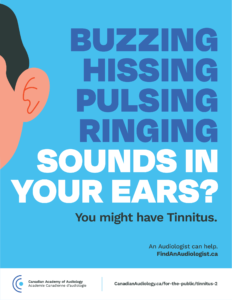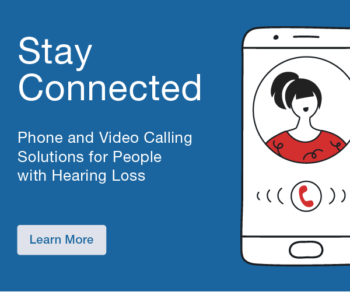Tinnitus
What is tinnitus?
Tinnitus is a perception of sound in one ear, both ears, or the head and is not associated with an external sound. Tinnitus is often described as ringing, buzzing, hissing, running water, chirping, or clicking. Sometimes tinnitus can manifest itself as music.
What causes Tinnitus?
Tinnitus is not a disease; it is a symptom of an underlying health condition. The most common health conditions associated with tinnitus are hearing loss related to noise exposure (e.g. music, loud equipment), aging-related hearing loss, ear infections (e.g. otitis media), head and neck traumas, medication (e.g. ototoxic), ear wax, or emotional stress (e.g. depression, anxiety).
Tinnitus can be temporary, as in the case of ear wax; once you remove the wax, tinnitus will go away. Tinnitus that lasts more than six months most likely will not go away, and you should have a tinnitus assessment and discuss possible tinnitus treatment.
Can tinnitus cause hearing loss?
No. Tinnitus can affect your concentration, but it does not cause hearing loss. In many cases, tinnitus is due to a pre-existing hearing loss.
To better understand tinnitus, you need to understand our auditory system and how we hear. Hearing is a series of events in which the ear converts sound waves into electrical signals and causes nerve impulses to transfer to the brain, where they interpret sound. Sound passes through the outer ear (ear canal), the middle ear (ossicles or middle ear bones) and the inner ear (cochlea and balance system) before the sound is converted to electrical signals and sent to the brain to be processed.
The two most common causes of tinnitus are noise exposure and aging-related hearing loss. These two types of hearing losses are related to the damage to the hair cells in the cochlea. The brain stops receiving correct information from the cochlea, causing an abnormal neural activity, which is perceived as tinnitus.
What happens in our brain when we start noticing Tinnitus?
Once our brain becomes aware of tinnitus, it can start to fixate on the sound. Several factors can influence our emotional reaction to this new sound. Is it annoying, or is it non-bothersome? If we negatively respond to our tinnitus, it can be more dominant in our lives, and our stress levels increase. Tinnitus is often worse at night because it is quieter. The increased level of tinnitus can make it difficult to fall asleep or have a good quality sleep, affecting the next day’s level of concentration. This negative reaction to tinnitus can set up a vicious circle of anxiety and annoyance.
What are the most common effects of tinnitus?
Tinnitus becomes a disorder when it starts affecting daily activities. The most common effects are anxiety, fatigue, stress, depression, trouble sleeping, lack of concentration, and sound intolerance.
What are some treatment options for tinnitus?
Tinnitus has no cure; however, there are several strategies to help you manage the condition.
Can tinnitus be prevented?
Tinnitus is linked to noise exposure. You can limit your exposure to loud noise by:
- Wearing hearing protection whenever you are exposed to loud noise at work
- Wearing hearing protection when using equipment or machinery such as lawnmowers, chain saws, snow blowers, leaf blowers, saws, nail guns and any power tools.
- Monitoring noise levels when doing hobbies and wearing hearing protection when needed for fitness classes, snowmobiling, quadding, or motorbiking.
- Wearing hearing protection when you attend concerts.
- Limiting the amount of time you listen to music through headphones.
Can an Audiologist help you manage your tinnitus?
Yes, Audiologists are university-trained (minimum master’s level) health care professionals specializing in hearing, balance, and related disorders such as Tinnitus. They have the expertise to assess, treat and educate about tinnitus.
What should I expect from a Tinnitus Evaluation appointment?
During a Tinnitus Evaluation appointment, your audiologist will review your medical history and go over a couple of questionnaires to evaluate the impact of tinnitus on your daily life activities. Since 80% of tinnitus sufferers have some degree of hearing loss, a full audiological assessment (including specific tinnitus measurement) is required to ensure a comprehensive understanding of your audiological profile and needs and recommend the best management plan. A referral to an ENT (Ear, nose, and throat doctor) or a Mental Health Professional might be required before a treatment plan recommendation.
What is the best tinnitus treatment plan?
A personalized approach is the best treatment option. After a Tinnitus Evaluation, if it is determined that an individual suffers from tinnitus, an audiologist will provide recommendations and management strategies for the patient and support their goals for intervention and (re)habilitation.
As for now, there are no drugs or dietary supplements that can treat tinnitus. Some medications can help with tinnitus side effects such as anxiety, depression, and sleep-related disorders. Examples of tinnitus management strategies include counselling to increase psychological and physical wellbeing, sound generators, hearing aids alone or hearing aids with a tinnitus masker and strategies to manage sound intolerance.
To find an Audiologist who specializes in tinnitus, click here




